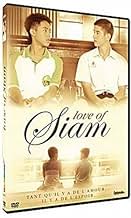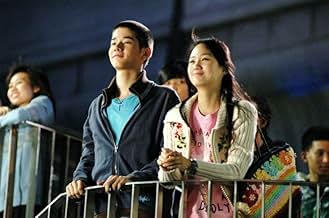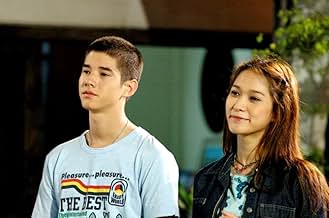PUNTUACIÓN EN IMDb
7,7/10
4,4 mil
TU PUNTUACIÓN
Añade un argumento en tu idiomaTwo boyhood friends are separated due to the disappearance of the sister of one of them, then later meet again as teenagers, when one of them has become a pop singer, and they discover feeli... Leer todoTwo boyhood friends are separated due to the disappearance of the sister of one of them, then later meet again as teenagers, when one of them has become a pop singer, and they discover feelings that they did not know they had.Two boyhood friends are separated due to the disappearance of the sister of one of them, then later meet again as teenagers, when one of them has become a pop singer, and they discover feelings that they did not know they had.
- Dirección
- Guión
- Reparto principal
- Premios
- 10 premios y 16 nominaciones en total
Jirayu La-ongmanee
- Young Tong
- (as Jirayu Laongmanee)
Jarunee Boonsake
- Physical Education Teacher
- (as Charunee Boonsek)
Nattapong Arunnate
- Earth
- (as Natthaphong Aroonnet)
Reseñas destacadas
I remember that when this movie released the trailer ,it convinced many people to misunderstand that it was a cute teenage movie like many blockbusters from GTH like Seasons change ,Dear Dakanda,My girl.Until they saw this movie,many audience felt very upset because it was a gay movie.
Nevertheless,I think this movie is surprisingly great I've ever thought.It's more than a gay movie.It also portrays family problems as well as teenager's.It is a story about two boys Tong and Mew who confront losing.Tong lost his sister so his parents is down falling while Mew lost his grandma who was only his love in all his life. Everyone in this movie needs something vital to fulfill all life. Something is called Love.This movie can show how powerful love is. Love can inspire Mew to write and sing a lovely song.Love can make this movie enjoyable and impressive easily because the powerful love for making this movie.So I admire Madaew,the director who is able to prove how to make effective movies from a social criticizing horror like 13Beloved to a powerful love story.
Besides that,the performances in this movie are excellently outstanding.Especially,the veteran SinJaI as Tong's mom who must encounter several problems bravely such as losing her daughter,alcoholic husband even having realized a shocking truth about her son.She looks inconsiderate and fussy but actually she still love her husband and son deeply. When she is sad,she will cry naturally but makes me hurt so much meanwhile the other actors were able to act very well.I hope that the teen actors in this movie will be promising stars soon.
Nevertheless,I think this movie is surprisingly great I've ever thought.It's more than a gay movie.It also portrays family problems as well as teenager's.It is a story about two boys Tong and Mew who confront losing.Tong lost his sister so his parents is down falling while Mew lost his grandma who was only his love in all his life. Everyone in this movie needs something vital to fulfill all life. Something is called Love.This movie can show how powerful love is. Love can inspire Mew to write and sing a lovely song.Love can make this movie enjoyable and impressive easily because the powerful love for making this movie.So I admire Madaew,the director who is able to prove how to make effective movies from a social criticizing horror like 13Beloved to a powerful love story.
Besides that,the performances in this movie are excellently outstanding.Especially,the veteran SinJaI as Tong's mom who must encounter several problems bravely such as losing her daughter,alcoholic husband even having realized a shocking truth about her son.She looks inconsiderate and fussy but actually she still love her husband and son deeply. When she is sad,she will cry naturally but makes me hurt so much meanwhile the other actors were able to act very well.I hope that the teen actors in this movie will be promising stars soon.
10zeleehom
Love hope sadness and joy !! I love this movie,not simply because its pure feelings but the love goes through it. You will love it no matter whether you are bent or straight!! After finishing this movie I cannot help crying, not fr sad, though it is a little sad in the end, but because those words and the whole press feelings in the duration of it. I am bent too, so I know how bitter it is for a gay to love a straight boy, and most of all, with a boy that cannot live with me but still says loves me!! Even in the straight world,it is unfair for both persons!! Wish you love it!!Cause it really exhibits a new world of your impression of Thailand!!
Much have been raved about Matthew Chukiat Sakveerakul's The Love of Siam, and thankfully I had managed to catch this on screen after it's been playing for some time over here on only one screen. Sakveerakul is perhaps more famous here for his thriller 13 Beloved (renamed 13: Game of Death here), but through this film had demonstrated he's equally adept at telling a romance and family drama.
The prologue for the film is somewhat extended, setting the stage for the lead characters. We have Mew (Witwisit Hiranyawongjul) who spends his childhood with his grandmother (Pimpan Buranapim), whose neighbours are a tight knit Catholic family headed by dad Korn (Songsit Roongniphakunsri), domineering mother Sunee (Sinraj Plengpanit), and children Tong (Mario Maurer) and Tang (Laila Boonyasak). A hiking trip resulted in the disappearance of Tang, and the grieving family moves away, temporarily grinding the friendship of the two boys Mew and Tong, to a halt.
Fast forward to today, Mew is now the brains and lead singer behind his huge boy band August, and is being courted by neighbour Ying (Kanya Rattapetch). Tong too faces girlfriend woes, where the school flower and spoilt brat Donut (Aticha Pongsilpipat, in a rather needless role here compared to Rattapetch's) faces a nonchalant Tong and draws an ultimatum of sorts. Sparks fly when the two boys reunite by chance on the streets, sparking into motion a series of events that would inevitably lead to a homosexual romance.
While it's easy to fall into a gimmicky promotional angle using the love between Tong and Mew, this film offered a lot more, especially that between Tong's family members. The missing Tang had caused Korn to become an insufferable alcoholic, while the mother stoically holds the family together, and the last thing she expects is for Tong to develop a liking for Mew. This segment of the story kicked into melodramatic overdrive when mom Sunee, with the help of the boys, convinces their friend June (also played by Laila Boonyasak), a dead ringer for her child, to pose as Tang and to snap Korn out of his depression.
Sakveerakul managed to weave into the narrative the different kinds of love all into one film - the unrequited, first crushes, first love, unconditional ones as given by parents to child, even stand-by-mes encouragement, support as seen by the members of August, and of course, bromance. With the family angle, there's the theme of coming to terms, and learning to let go, which I felt was the richer of the two main threads running through the narrative.
It's a beautiful film, not only because having a bevy of pretty looking cast members helped, but also because it had a wonderful looking set of production sets and values, and while I have to rely on the subtitles to understand the song lyrics, the melodies here are simply marvelous. Korea and Japan had to watch out, because Sakveerakul has shown that Thailand is fast catching up in making heartfelt, coming of age romances that would tug at your heartstrings.
What's more interesting here is that the film is rated M18, without a cut detected, and even more so, the kissing scenes between Mew and Tong were left intact. Many years ago, there would be a straight out censorship snip at the scene to the cutting room floor, and in more recent times, a scene like this would be shortened and slapped with an R21 rating. An M18 rating for this seemed to point to a relaxation of the rules, though A Frozen Flower had demonstrated that sex between men are still snipped and slapped with an R21 rating.
The prologue for the film is somewhat extended, setting the stage for the lead characters. We have Mew (Witwisit Hiranyawongjul) who spends his childhood with his grandmother (Pimpan Buranapim), whose neighbours are a tight knit Catholic family headed by dad Korn (Songsit Roongniphakunsri), domineering mother Sunee (Sinraj Plengpanit), and children Tong (Mario Maurer) and Tang (Laila Boonyasak). A hiking trip resulted in the disappearance of Tang, and the grieving family moves away, temporarily grinding the friendship of the two boys Mew and Tong, to a halt.
Fast forward to today, Mew is now the brains and lead singer behind his huge boy band August, and is being courted by neighbour Ying (Kanya Rattapetch). Tong too faces girlfriend woes, where the school flower and spoilt brat Donut (Aticha Pongsilpipat, in a rather needless role here compared to Rattapetch's) faces a nonchalant Tong and draws an ultimatum of sorts. Sparks fly when the two boys reunite by chance on the streets, sparking into motion a series of events that would inevitably lead to a homosexual romance.
While it's easy to fall into a gimmicky promotional angle using the love between Tong and Mew, this film offered a lot more, especially that between Tong's family members. The missing Tang had caused Korn to become an insufferable alcoholic, while the mother stoically holds the family together, and the last thing she expects is for Tong to develop a liking for Mew. This segment of the story kicked into melodramatic overdrive when mom Sunee, with the help of the boys, convinces their friend June (also played by Laila Boonyasak), a dead ringer for her child, to pose as Tang and to snap Korn out of his depression.
Sakveerakul managed to weave into the narrative the different kinds of love all into one film - the unrequited, first crushes, first love, unconditional ones as given by parents to child, even stand-by-mes encouragement, support as seen by the members of August, and of course, bromance. With the family angle, there's the theme of coming to terms, and learning to let go, which I felt was the richer of the two main threads running through the narrative.
It's a beautiful film, not only because having a bevy of pretty looking cast members helped, but also because it had a wonderful looking set of production sets and values, and while I have to rely on the subtitles to understand the song lyrics, the melodies here are simply marvelous. Korea and Japan had to watch out, because Sakveerakul has shown that Thailand is fast catching up in making heartfelt, coming of age romances that would tug at your heartstrings.
What's more interesting here is that the film is rated M18, without a cut detected, and even more so, the kissing scenes between Mew and Tong were left intact. Many years ago, there would be a straight out censorship snip at the scene to the cutting room floor, and in more recent times, a scene like this would be shortened and slapped with an R21 rating. An M18 rating for this seemed to point to a relaxation of the rules, though A Frozen Flower had demonstrated that sex between men are still snipped and slapped with an R21 rating.
Needless to say that so many people have been touched by the movie. But why? I can't even remember which was the last movie that touched me for years...
I would say it's due to "purity". Nothing but love in the movie, all kinds of love, family, friends, lovers... everyone in the movie loves everyone else in the movie in their own ways, almost, but very tragical at the same time...
There is not much contrast used in the movie, unlike other love movies, e.g. love vs. war, or love vs. religion etc... even the boy-boy love looks so natural...
They are just common people, common family, common school, common boys and girls, you cannot say anything from their material lives that you don't have, but i bet you may not have their love.
And some thinks the movie is too long... but i would say, this is why the movie is so depictive... i recall a flavour of famous Shanghai female writer... the very old song played by the granny is from Shanghai singer, Wu Yingyin, who's still alive and singing. :)
I would say it's due to "purity". Nothing but love in the movie, all kinds of love, family, friends, lovers... everyone in the movie loves everyone else in the movie in their own ways, almost, but very tragical at the same time...
There is not much contrast used in the movie, unlike other love movies, e.g. love vs. war, or love vs. religion etc... even the boy-boy love looks so natural...
They are just common people, common family, common school, common boys and girls, you cannot say anything from their material lives that you don't have, but i bet you may not have their love.
And some thinks the movie is too long... but i would say, this is why the movie is so depictive... i recall a flavour of famous Shanghai female writer... the very old song played by the granny is from Shanghai singer, Wu Yingyin, who's still alive and singing. :)
I can see where the previous commentator came from. However, maybe biased by my own liking of mellow and subtle plot-weaving, I enjoyed the overall picture painted by the music, 2 main actors, and the parents and June.
I personally favor this movie because it doesn't construct/explain explicitly the events and personality surrounding each character as concrete context of the story, which is often a technique used by mainstream films to materialize climax and logic of a movie's plot (e.g. she acts/feels this way because it was established that she was such and such...).
Therefore I suppose the reason so many people like this movie literally across the globe (mainly observed on forums from the United States, Taiwan, Hong Kong, China, Philippines, and Europe), is because it uses a Thai case to exemplify humanity's constrained reaction toward its surrounding.
Without spoiling the movie, I am referring to the scenes the director ended up choosing as plot construction regarding characters' emotions and actions. Instead of picking the conventional expression that would usually indicate 'sad', 'she is going to blow up', and 'angry', the scenes selected to continue the flow and plot of the movie are rather life-like: Life doesn't always present significant events with significant background music and conventional cues, which often supports both the actors and audiences in moving the drama (or movie in this case) along.
So my friends and I love the movie for such illumination that: if the contemporary cultures often internalize certain procedures, cues, and embodiment that connect external events and internal reactions/feelings, what are humans to do in a real world that is not tamed by our rule?
Maybe from a more speculative audience's eye: what can we possibly do if we cannot bear to lose the one we love, and what if we go on life without loving anyone at all? The movie achieves a 9/10 for me despite its weak elements (some acting are definitely...not so great, but I don't speak Thai and don't know the culture), exactly because it constructs a unconventional platform (the acting, climax-devices, the music, and plot) and operates consistently along its story-telling (a gradually broadening perspective of love across generation (Mew-grandmother), time/space (Tong's family & sister), gender (Mew & Tong), and the peripheral Others (the Chinese-Thai Ying and her crush on Mew, and the Catholic family)).
I personally favor this movie because it doesn't construct/explain explicitly the events and personality surrounding each character as concrete context of the story, which is often a technique used by mainstream films to materialize climax and logic of a movie's plot (e.g. she acts/feels this way because it was established that she was such and such...).
Therefore I suppose the reason so many people like this movie literally across the globe (mainly observed on forums from the United States, Taiwan, Hong Kong, China, Philippines, and Europe), is because it uses a Thai case to exemplify humanity's constrained reaction toward its surrounding.
Without spoiling the movie, I am referring to the scenes the director ended up choosing as plot construction regarding characters' emotions and actions. Instead of picking the conventional expression that would usually indicate 'sad', 'she is going to blow up', and 'angry', the scenes selected to continue the flow and plot of the movie are rather life-like: Life doesn't always present significant events with significant background music and conventional cues, which often supports both the actors and audiences in moving the drama (or movie in this case) along.
So my friends and I love the movie for such illumination that: if the contemporary cultures often internalize certain procedures, cues, and embodiment that connect external events and internal reactions/feelings, what are humans to do in a real world that is not tamed by our rule?
Maybe from a more speculative audience's eye: what can we possibly do if we cannot bear to lose the one we love, and what if we go on life without loving anyone at all? The movie achieves a 9/10 for me despite its weak elements (some acting are definitely...not so great, but I don't speak Thai and don't know the culture), exactly because it constructs a unconventional platform (the acting, climax-devices, the music, and plot) and operates consistently along its story-telling (a gradually broadening perspective of love across generation (Mew-grandmother), time/space (Tong's family & sister), gender (Mew & Tong), and the peripheral Others (the Chinese-Thai Ying and her crush on Mew, and the Catholic family)).
¿Sabías que...?
- CuriosidadesThailand's 2009 Academy Awards official submission to Foreign-Language Film category.
- Versiones alternativasThe Director's Cut of the movie has a running time of 178 minutes.
Selecciones populares
Inicia sesión para calificar y añadir a tu lista para recibir recomendaciones personalizadas
- How long is Love of Siam?Con tecnología de Alexa
Detalles
- Fecha de lanzamiento
- País de origen
- Sitios oficiales
- Idioma
- Títulos en diferentes países
- Love of Siam
- Localizaciones del rodaje
- Empresas productoras
- Ver más compañías en los créditos en IMDbPro
Taquilla
- Recaudación en todo el mundo
- 1.405.711 US$
- Duración2 horas 58 minutos
- Color
- Mezcla de sonido
- Relación de aspecto
- 1.85 : 1
Contribuir a esta página
Sugerir un cambio o añadir el contenido que falta

Principal laguna de datos
By what name was Rak haeng Siam (2007) officially released in India in English?
Responde










